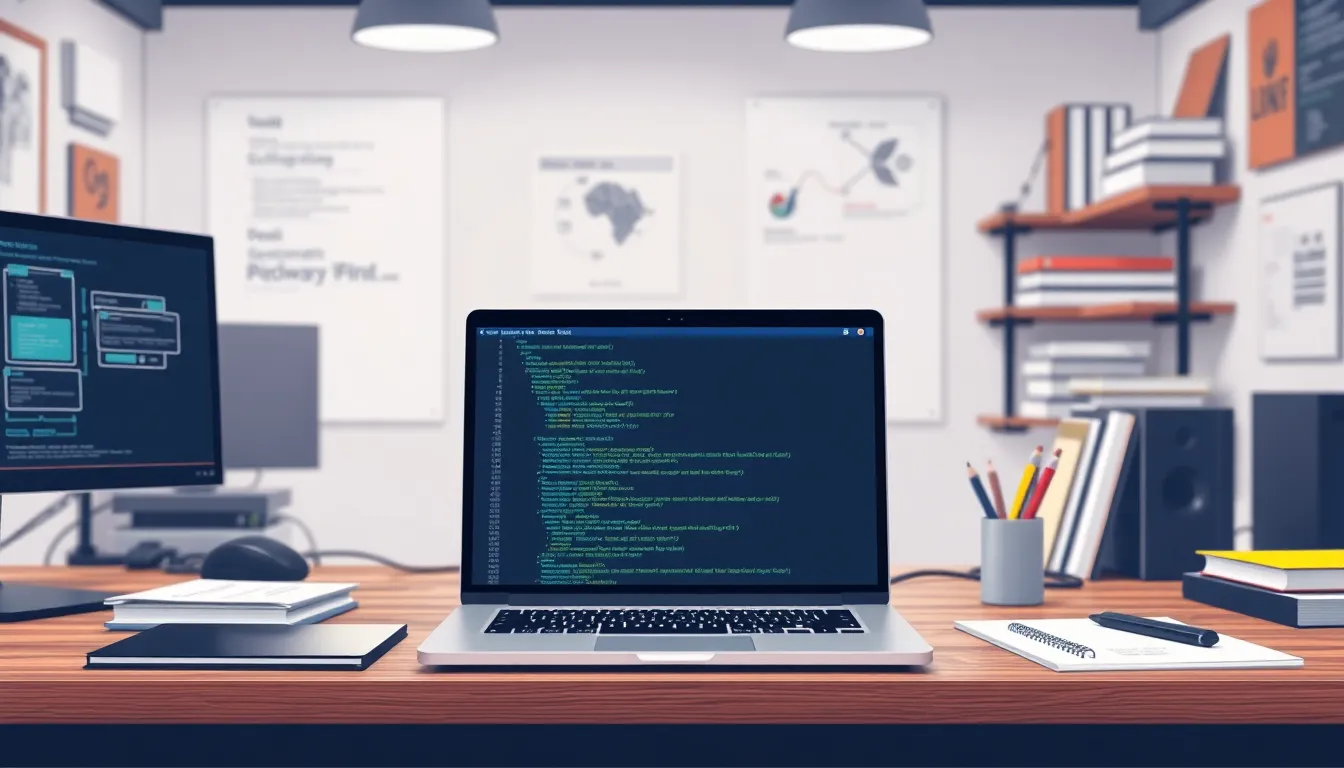Delphi programming language has been around longer than most memes, yet it still manages to pack a punch in the world of software development. With its roots in Object Pascal, Delphi combines the elegance of high-level programming with the efficiency of low-level coding. It’s like having your cake and eating it too—if that cake could also help you build robust applications faster than you can say “debugging.”
For developers seeking a tool that’s as versatile as a Swiss Army knife, Delphi stands out. It’s perfect for creating everything from desktop applications to mobile solutions. So if you’re tired of wrestling with clunky languages that seem to have a mind of their own, it might be time to give Delphi a whirl. After all, who doesn’t want to code with a language that feels like it’s giving them a high-five every time they compile?
Delphi Programming Language
Delphi programming language emerged from Object Pascal, providing a robust framework for software development. This language excels in combining high-level programming features with low-level system access, offering both efficiency and ease of use. Various applications, including desktop, mobile, and web software, benefit from Delphi’s versatile capabilities.
Developers appreciate Delphi’s rapid application development (RAD) environment, which simplifies the creation of graphical user interfaces (GUIs). Tools like the Visual Component Library (VCL) streamline application design, enabling quick deployment across multiple platforms. The integrated development environment (IDE) enhances productivity with features such as code completion, debugging tools, and a dedicated database access framework.
Community support strengthens Delphi’s viability, with an active user base sharing resources, libraries, and frameworks. Regular updates from the vendor ensure developers access modern features and security improvements. Many industries, including finance, education, and healthcare, leverage Delphi for mission-critical applications due to its stability and performance.
Performance metrics indicate that applications built with Delphi maintain responsiveness, crucial for user satisfaction. Language interoperability allows seamless integration with other programming languages, broadening its usability. Additionally, Delphi’s strong emphasis on object-oriented principles enhances code readability and reusability, aligning with contemporary software development practices.
Overall, the Delphi programming language serves as a compelling option for developers seeking a reliable, efficient, and user-friendly platform for application development.
History Of Delphi Programming Language

Delphi programming language has a rich history that traces back to the early 1990s. Its development began with the objective of creating a highly productive environment for building Windows applications.
Key Milestones
Borland introduced Delphi in 1995, establishing it as a significant upgrade to Object Pascal. This release incorporated an integrated development environment (IDE) that streamlined application development. The introduction of Delphi 2 in 1996 marked the transition to Windows 95 and enhanced support for 32-bit applications. Subsequent versions added features like database connectivity and web development tools, expanding Delphi’s capabilities. The launch of Delphi 7 in 2002 solidified its place in the programming landscape, offering improved stability and performance enhancements. These milestones illustrate Delphi’s adaptability to technological advancements while maintaining user-friendliness.
Evolution Over Time
Over the years, Delphi adapted to changes in software development trends. In 2005, a new version aimed at the .NET framework emerged, reflecting the growing demand for cross-platform capabilities. The acquisition of Delphi by Embarcadero Technologies in 2008 paved the way for a revitalized focus on modern application development. Modern iterations like Delphi 10.x introduced mobile application support, extending Delphi’s reach into iOS and Android markets. Regular updates have ensured that Delphi remains relevant, incorporating features like FireUI for multi-platform development and enhanced cloud services integration. This ongoing evolution showcases Delphi’s commitment to meeting the diverse needs of developers in a rapidly changing technological landscape.
Features Of Delphi Programming Language
Delphi programming language boasts several features that enhance its appeal to developers. These features contribute to its reputation as a reliable and efficient tool for software development.
Object-Oriented Programming
Object-oriented programming principles are fundamental to Delphi. This paradigm promotes code organization through encapsulation, inheritance, and polymorphism. Developers create modular code structures that enhance maintainability and enable easy collaboration. Delphi’s strong emphasis on objects increases code reuse across applications. Efficient class support ensures that complex data types can be defined and manipulated seamlessly. With its built-in support for exception handling, Delphi allows for the creation of robust applications. This feature set attracts programmers who prioritize clear, maintainable code while building feature-rich, scalable applications.
Rapid Application Development
Rapid application development is a standout feature of Delphi. It streamlines the development process with visual design tools and components. Using the Visual Component Library, developers can drag and drop components, expediting GUI creation. The integrated development environment reduces time spent on coding, testing, and debugging. Built-in templates and frameworks support fast prototyping, enabling quick iterations and feedback. This approach facilitates a shorter time-to-market for applications. Thanks to Delphi’s multi-device capabilities, developers can deliver applications that run on various platforms without extensive rewrites. Overall, Delphi’s RAD capabilities address the demands of modern software development while maintaining high quality and performance.
Advantages Of Using Delphi
Delphi offers several advantages that enhance its appeal for software development. Its powerful features optimize productivity and application performance, making it a top choice for developers.
Performance Benefits
Performance metrics highlight Delphi’s capability for building responsive applications. Applications created with Delphi often exhibit faster execution speeds compared to other languages due to its compiled nature. Efficient memory management minimizes resource consumption, contributing to overall effectiveness. Each application maintains stability even under heavy workloads, making Delphi a reliable option for mission-critical software. Developers frequently report improved user experiences, ensured by low-latency responses.
Comprehensive Library Support
Delphi boasts a rich set of libraries that facilitate rapid development. The Visual Component Library (VCL) provides pre-built components for GUI design, significantly reducing development time. Additionally, developers access a wide range of third-party libraries that extend functionality. This extensive support encourages the creation of diverse applications across industries. Libraries include tools for database access, web services, and more, enhancing overall productivity. Resource availability simplifies integration with existing systems and promotes collaboration among developers.
Use Cases Of Delphi Programming Language
Delphi programming language serves various applications, contributing to numerous sectors. Its flexibility and robust feature set suit different development needs.
Desktop Application Development
Delphi excels in desktop application development with its rapid application development (RAD) environment. Developers utilize tools like the Visual Component Library (VCL) to create high-performance Windows applications. Its object-oriented structure enhances code organization, allowing for modular application design. The ability to access native Windows APIs boosts integration with system-level functionality. Many professionals leverage Delphi for enterprise solutions, ensuring stability and performance in critical applications. Financial institutions frequently rely on Delphi for their desktop applications due to its strong support for database connectivity. Overall, Delphi’s speed and efficiency make it a popular choice among developers aiming for quick deployment of desktop software.
Mobile Application Development
Delphi’s capabilities extend to mobile application development, allowing developers to target multiple platforms using a single codebase. The introduction of FireUI facilitates the creation of responsive applications for both iOS and Android. Developers benefit from Delphi’s cross-platform features, which enable quick adjustments for different screen sizes and resolutions. Its rich library of components accelerates the development process, reducing time spent on UI design. Numerous companies utilize Delphi to deliver seamless mobile experiences, capitalizing on its fast execution and low-latency responses. Delphi’s IDE ensures a smooth workflow, enhancing collaboration among development teams. As a result, Delphi stands out for mobile application projects that demand high performance and rapid development cycles.
Conclusion
Delphi remains a powerful choice for developers seeking efficiency and versatility in application development. Its unique blend of high-level features and low-level control allows for the creation of robust applications across various platforms. With a strong focus on object-oriented principles and a rich set of libraries, Delphi enhances productivity and code maintainability.
The ongoing support from the developer community and regular updates ensure that Delphi continues to evolve with technological advancements. As industries increasingly rely on high-performance applications, Delphi’s capabilities in both desktop and mobile development make it a compelling option for modern software solutions. Embracing Delphi can lead to faster development cycles and improved user experiences, solidifying its place in the programming landscape.



